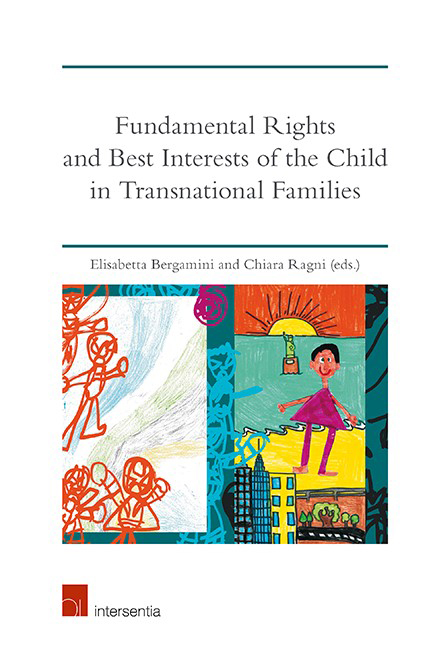Book contents
- Frontmatter
- Dedication
- Preface
- Acknowledgements
- Contents
- List of Cases
- List of Authors
- PART I THE IMPACT OF HUMAN RIGHTS AND OF THE BEST INTERESTS OF THE CHILD ON EU FREE MOVEMENT AND MIGRATION LAW
- PART II THE BEST INTERESTS OF THE CHILD AS A CONCERN OF HUMAN RIGHTS AND EUROPEAN PRIVATE INTERNATIONAL LAW
- The Place of Human Rights in the Private International Law of the Union in Family Matters
- The Best Interests of the Child Principle at the Intersection of Private International Law and Human Rights
- Recognition of a Foreign Status Filii: Pursuing the Best Interests Principle
- Surrogacy Arrangements and the Best Interests of the Child: The Case Law of the European Court of Human Rights
- Cross-Border Recognition of Adoption: Rethinking Private International Law from a Human Rights Perspective
- Protecting Children's Rights aft er Child Abduction: The Interaction of the CJEU and ECtHR in Interpreting Brussels II bis
- Cross-Border Parental Child Abduction in the EU: Is there Room for a Human Rights Exception?
- Impact of the Best Interests of the Child on the Brussels II ter Regulation
- Provisional Measures and the Best Interests of the Child in the Field of Parental Responsibility
- Index
- About the Editors
The Best Interests of the Child Principle at the Intersection of Private International Law and Human Rights
from PART II - THE BEST INTERESTS OF THE CHILD AS A CONCERN OF HUMAN RIGHTS AND EUROPEAN PRIVATE INTERNATIONAL LAW
Published online by Cambridge University Press: 12 November 2019
- Frontmatter
- Dedication
- Preface
- Acknowledgements
- Contents
- List of Cases
- List of Authors
- PART I THE IMPACT OF HUMAN RIGHTS AND OF THE BEST INTERESTS OF THE CHILD ON EU FREE MOVEMENT AND MIGRATION LAW
- PART II THE BEST INTERESTS OF THE CHILD AS A CONCERN OF HUMAN RIGHTS AND EUROPEAN PRIVATE INTERNATIONAL LAW
- The Place of Human Rights in the Private International Law of the Union in Family Matters
- The Best Interests of the Child Principle at the Intersection of Private International Law and Human Rights
- Recognition of a Foreign Status Filii: Pursuing the Best Interests Principle
- Surrogacy Arrangements and the Best Interests of the Child: The Case Law of the European Court of Human Rights
- Cross-Border Recognition of Adoption: Rethinking Private International Law from a Human Rights Perspective
- Protecting Children's Rights aft er Child Abduction: The Interaction of the CJEU and ECtHR in Interpreting Brussels II bis
- Cross-Border Parental Child Abduction in the EU: Is there Room for a Human Rights Exception?
- Impact of the Best Interests of the Child on the Brussels II ter Regulation
- Provisional Measures and the Best Interests of the Child in the Field of Parental Responsibility
- Index
- About the Editors
Summary
THE RELATIONSHIP BETWEEN PRIVATE INTERNATIONAL LAW AND HUMAN RIGHTS
Private international law and international human rights law intersect whenever the solution of cases with international aspects endangers the enjoyment of a fundamental right or freedom, or when the protection of human rights, as ensured by international judicial mechanisms, risks jeopardising the normal functioning of the rules governing the conflict of laws.
Scholarship, albeit inspired by a variety of legal perspectives, has attempted to theoretically frame these potential points of friction, basically referring to the idea that, directly or indirectly, the way the rules governing the conflict of laws function are by now influenced and conditioned by the pervasive nature of rules protecting human rights. It should thus be remembered that many authors have for some time been aware of, if not actually predicted, in regulatory and social contexts different from ours, the complex legal issues we are dealing with here.
In fact, in an era in which the fragmentation of regulatory regimes prevails, in which the stratification of international, European and national sources results in complex dynamics of coordination and balancing of the legal values underlying the various disciplines; at a time when international jurisdictions themselves, starting with the ECtHR, are struggling to keep up with ‘new’ demands for the protection of individuals; private international law, by its nature an expression of the will to go beyond the normative divergences between systems, is undergoing a profound transformation and experiencing rediscovered vitality, having to reconcile public and private, general and particular interests under the ‘watchful eye’ of internationally recognised standards of human rights.
Without in these few introductory lines going into the merits of issues that would require much deeper analysis of the scholarship, we here start with the assumption that the current rules governing the conflict of laws, by their nature and characteristics based on a plurality of methods of coordination between systems, have among their many objectives also that of avoiding the occurrence of situations that are harmful to human rights. This is achieved sometimes by encouraging the integration of different legal cultures, at others by preserving national identities, or pursuing a specific material interest.
- Type
- Chapter
- Information
- Publisher: IntersentiaPrint publication year: 2019
- 1
- Cited by



